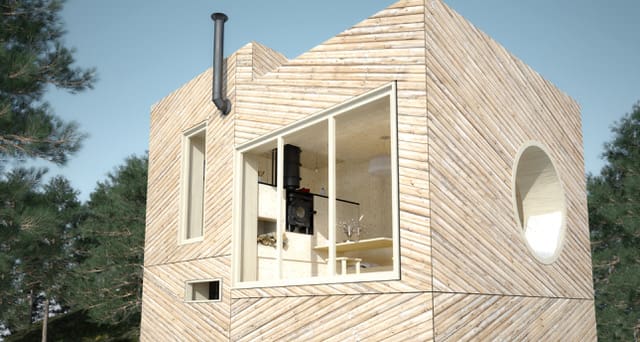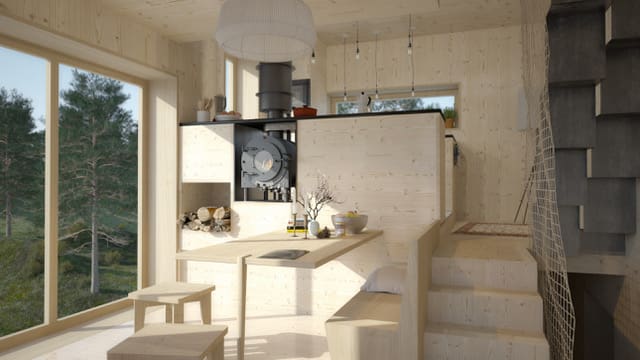Do you know the fairytale “The Three Little Pigs,” where two of the three pigs are described as lazy, which is why they built their houses out of straw and sticks? This was, of course, their downfall, and the wolf blew their houses down.
Well, I’d love to tell a modern-day version, and revamp the moral of the story to reflect the genius of using local, biodegradable, natural materials in a small, cradle-to-cradle design in order to reduce the environmental impact! And my protagonist would be Damian Breitenstein, founder of LIVO, one of the startups of the 2021 Impact Hub Basel Incubation program.
What is LIVO?
Inspired by the Austrian forest engineer and entrepreneur Erwin Thoma, a LIVO home is produced with locally sourced, solid wood panels used for the walls, ceiling and roof components. These panels are constructed in a factory by a special machine, so they are ultra-precise – which means ultra-low waste! Rather than adhesives and screws, wood dowels are used to connect the panels, making future deconstruction and reuse easy.
The homes are self-contained units, with furniture and kitchen built in, compost toilets and solar panels. And with graywater and rainwater collection, they are designed to be built on ‘unusable’ land that doesn’t allow for tapping into the water system (perhaps due to pollution), an important feature in today’s cities and growing population. In addition, they are currently working on a new toilet which uses microbes and creates biogas and fertilizer from the waste.

LIVO homes are designed to have a small footprint, but that doesn’t mean you have to sacrifice living space – the modules are made to be stacked and customized to your needs.
And here’s the kicker—large screws drilled into the ground replace the more traditional (and environmentally unfriendly) concrete foundation so the home can be built and deconstructed, leaving very little impact on the environment.
Why should I support LIVO?
Today’s buildings not only are made from imported resources that carry a large carbon footprint, but they also contain all sorts of adhesives and materials that off-gas, causing poor indoor air quality. According to Designing Buildings Wiki, despite available options of reusing or recycling materials and reducing the amount of waste produced in the first place, a large amount of construction waste is still disposed of in landfills. 32% of landfill waste comes from the construction and demolition of buildings and 13% of products delivered to construction sites are sent directly to landfills without even being used.
Say what? Sorry to state the obvious but we simply do not live in a world that can support this kind of wasteful practice. We must do better! Thankfully, with LIVO’s innovative practices, we can choose to do so, easily.

Our core values develop over our lives, and for Damian, his certainly were influenced by studying industrial design. He said something during the interview that struck me: “When you reproduce something a million times, it can have a good impact or a bad, depending on how it’s built.”
When you think about the total, long-term impact of that—one ‘bad’ design choice, multiplied by millions—it really drives home the point that each of us, each of our actions, truly does make a difference.

I could go on and on gushing about this startup and how much I’m a believer in Damian and LIVO, and I hope you’re on board, too. To read more about their story and get updates, check out their website. They are currently getting funding and looking to build their prototype in January 2022. This September, you can support their efforts by donating to their wemakeit campaign. Check their website for exact details and updates.
LIVO supports SDGs: 9, 11, 12, 13
by Carrie Aikman (Text) & Ina Wecken (Video)
